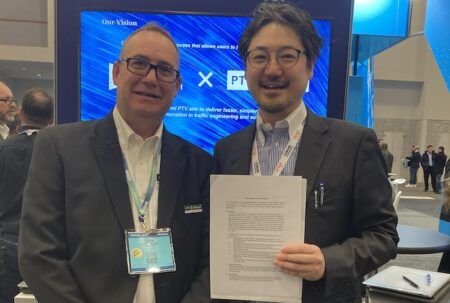Anglo-Australian parking systems company Smart Parking Limited has joined the Singapore Smart Mobility Test Bed Consortium that was jointly started by Nanyang Technological University (NTU) and NXP Semiconductors.
The Smart Mobility Consortium, supported by Singapore’s Economic Development Board, sees a number of high-tech companies, research organizations, academics and government agencies come together to research and test next-generation V2X (vehicle-to-everything) technologies that aim to enhance commuter safety and transportation systems. The formation of the consortium is in line with Singapore’s Smart Mobility 2030 vision, making the city state a global innovation hub for intelligent transport systems. As part of the consortium, Smart Parking will install 159 of its infrared vehicle detection sensors in the NTU-NXP Smart Mobility test bed for smart cars and traffic systems, located on NTU’s 200-hectare campus.
Earlier this week Smart Parking demonstrated its parking bay sensor system at the flagship Industry Partnership Showcase event, marking the official launch of the NTU-NXP Smart Mobility Consortium, under the theme of Shaping the Future Connected Mobility Ecosystem. The consortium is striving to play a pivotal role in shaping the future connected mobility eco-system by providing the NTU campus as a live, real-world test bed for research, education and co-creation of new innovations in future mobility and transportation solutions. At the event, future leaders were given the opportunity to network with key stakeholders in the field of connected mobility, and to experience the latest mobility solutions and live demonstrations by consortium members.
“We are proud to showcase our smart parking technology within the NTU-NXP Smart Mobility Test Bed, said Smart Parking’s CEO, Paul Gillespie.” Smart Mobility research is crucial in developing future systems that enable people in a smart city like Singapore to get where they need to be safely and efficiently. Working with the Smart Mobility Consortium also allows us to tap into the Consortium’s expertise in implementing its vision for future systems.”




